Organisational Behaviour Report: David & Co. Ltd. Analysis
VerifiedAdded on 2023/02/02
|19
|5651
|62
Report
AI Summary
This report provides an in-depth analysis of organisational behaviour, focusing on the influence of power, politics, and culture on employee behaviour within David & Co. Ltd., a food manufacturing and distribution company. The report explores various aspects of power dynamics, including legitimate, reward, coercive, expert, referent, and informational power, and how these influence the workforce. It also examines Chanlat's characteristics of political behaviour and the impact of organisational culture, utilizing Handy's cultural typology to understand the company's approach. Furthermore, the report delves into motivation theories, specifically Maslow's hierarchy of needs, to understand employee needs and how they affect their work performance. The report concludes with a comprehensive overview of how different organisational behaviour concepts can be implemented to improve employee engagement, productivity, and overall organisational success. The report also discusses how these elements can be implemented and provides recommendations for improvement.
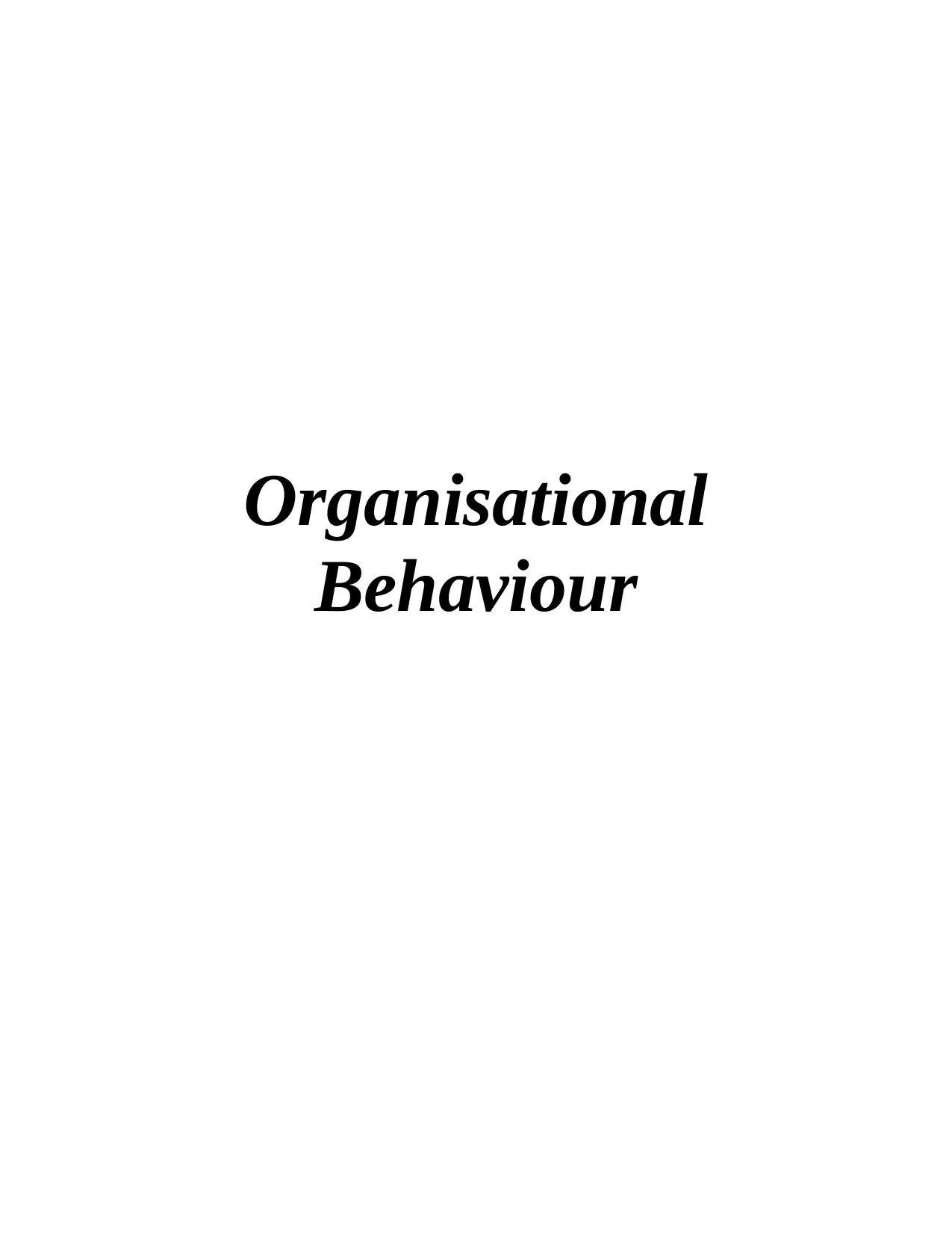
Organisational
Behaviour
Behaviour
Paraphrase This Document
Need a fresh take? Get an instant paraphrase of this document with our AI Paraphraser
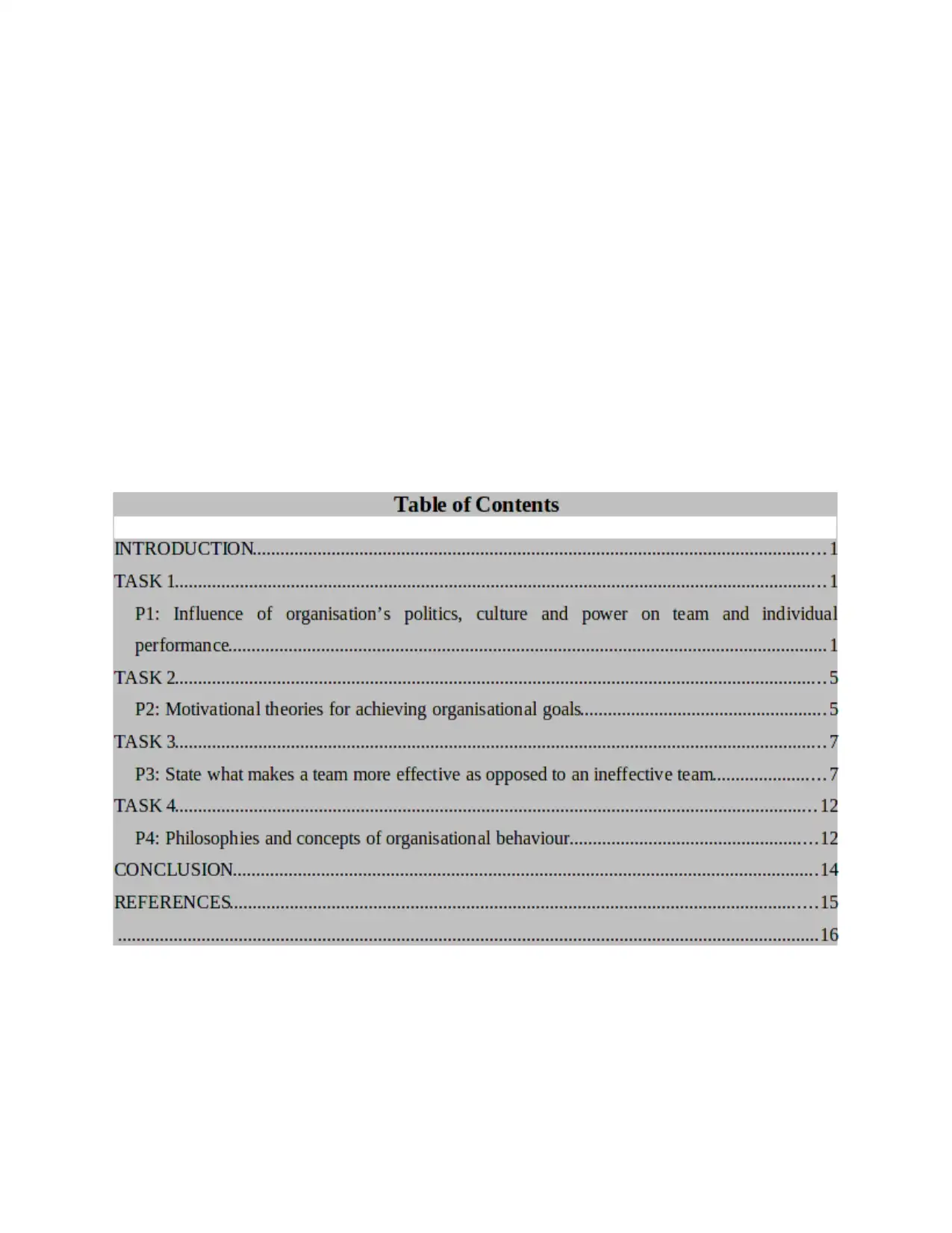
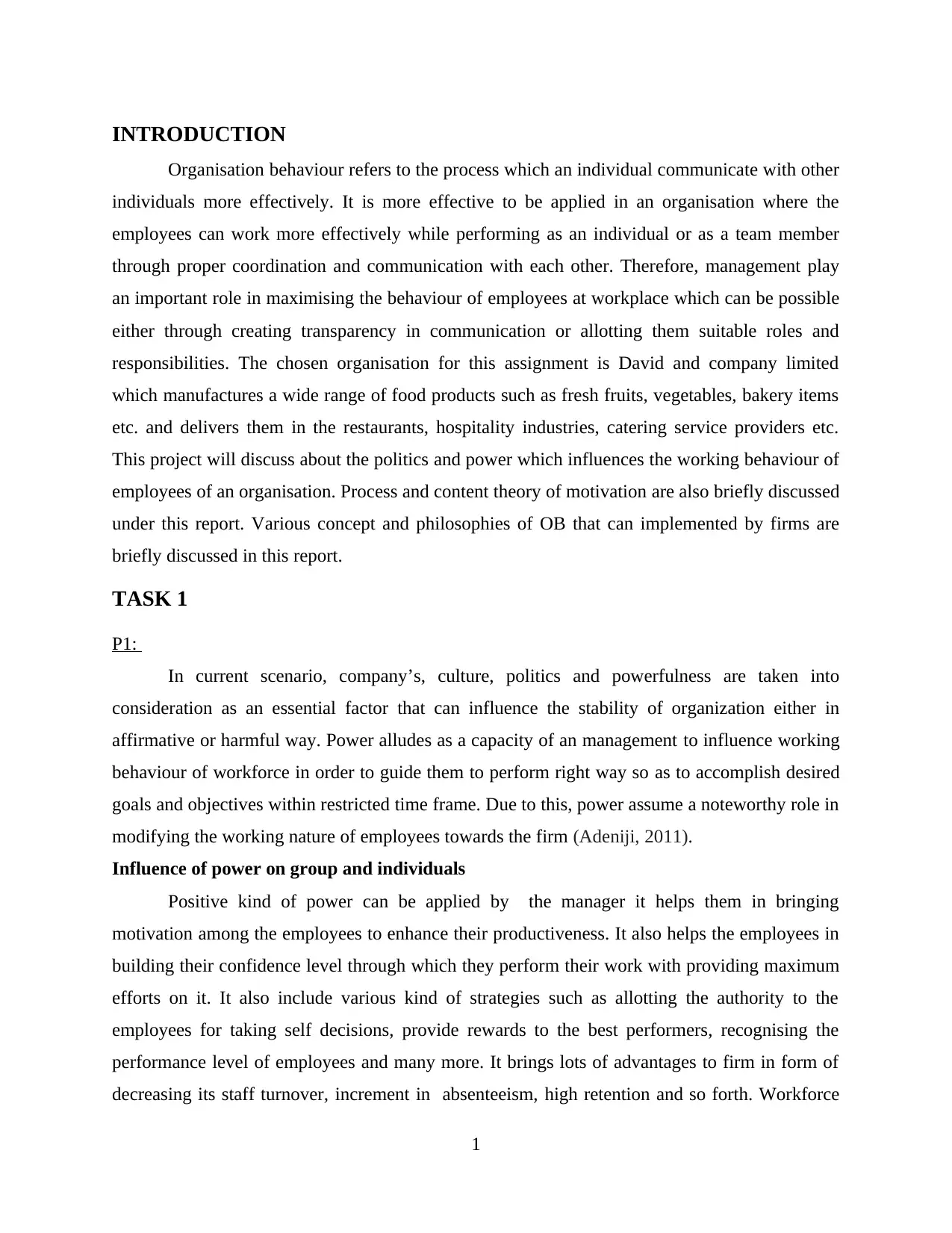
INTRODUCTION
Organisation behaviour refers to the process which an individual communicate with other
individuals more effectively. It is more effective to be applied in an organisation where the
employees can work more effectively while performing as an individual or as a team member
through proper coordination and communication with each other. Therefore, management play
an important role in maximising the behaviour of employees at workplace which can be possible
either through creating transparency in communication or allotting them suitable roles and
responsibilities. The chosen organisation for this assignment is David and company limited
which manufactures a wide range of food products such as fresh fruits, vegetables, bakery items
etc. and delivers them in the restaurants, hospitality industries, catering service providers etc.
This project will discuss about the politics and power which influences the working behaviour of
employees of an organisation. Process and content theory of motivation are also briefly discussed
under this report. Various concept and philosophies of OB that can implemented by firms are
briefly discussed in this report.
TASK 1
P1:
In current scenario, company’s, culture, politics and powerfulness are taken into
consideration as an essential factor that can influence the stability of organization either in
affirmative or harmful way. Power alludes as a capacity of an management to influence working
behaviour of workforce in order to guide them to perform right way so as to accomplish desired
goals and objectives within restricted time frame. Due to this, power assume a noteworthy role in
modifying the working nature of employees towards the firm (Adeniji, 2011).
Influence of power on group and individuals
Positive kind of power can be applied by the manager it helps them in bringing
motivation among the employees to enhance their productiveness. It also helps the employees in
building their confidence level through which they perform their work with providing maximum
efforts on it. It also include various kind of strategies such as allotting the authority to the
employees for taking self decisions, provide rewards to the best performers, recognising the
performance level of employees and many more. It brings lots of advantages to firm in form of
decreasing its staff turnover, increment in absenteeism, high retention and so forth. Workforce
1
Organisation behaviour refers to the process which an individual communicate with other
individuals more effectively. It is more effective to be applied in an organisation where the
employees can work more effectively while performing as an individual or as a team member
through proper coordination and communication with each other. Therefore, management play
an important role in maximising the behaviour of employees at workplace which can be possible
either through creating transparency in communication or allotting them suitable roles and
responsibilities. The chosen organisation for this assignment is David and company limited
which manufactures a wide range of food products such as fresh fruits, vegetables, bakery items
etc. and delivers them in the restaurants, hospitality industries, catering service providers etc.
This project will discuss about the politics and power which influences the working behaviour of
employees of an organisation. Process and content theory of motivation are also briefly discussed
under this report. Various concept and philosophies of OB that can implemented by firms are
briefly discussed in this report.
TASK 1
P1:
In current scenario, company’s, culture, politics and powerfulness are taken into
consideration as an essential factor that can influence the stability of organization either in
affirmative or harmful way. Power alludes as a capacity of an management to influence working
behaviour of workforce in order to guide them to perform right way so as to accomplish desired
goals and objectives within restricted time frame. Due to this, power assume a noteworthy role in
modifying the working nature of employees towards the firm (Adeniji, 2011).
Influence of power on group and individuals
Positive kind of power can be applied by the manager it helps them in bringing
motivation among the employees to enhance their productiveness. It also helps the employees in
building their confidence level through which they perform their work with providing maximum
efforts on it. It also include various kind of strategies such as allotting the authority to the
employees for taking self decisions, provide rewards to the best performers, recognising the
performance level of employees and many more. It brings lots of advantages to firm in form of
decreasing its staff turnover, increment in absenteeism, high retention and so forth. Workforce
1
⊘ This is a preview!⊘
Do you want full access?
Subscribe today to unlock all pages.

Trusted by 1+ million students worldwide
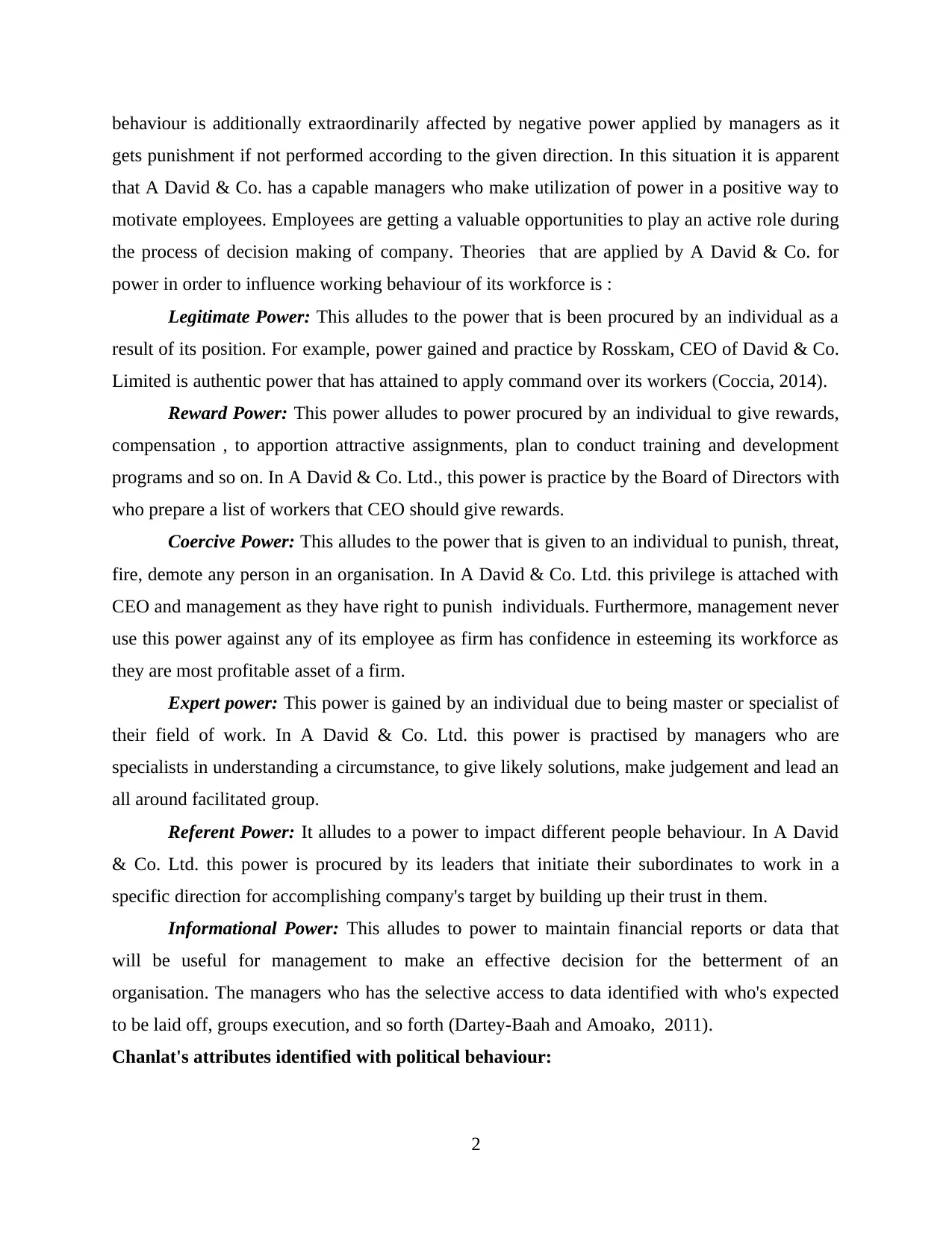
behaviour is additionally extraordinarily affected by negative power applied by managers as it
gets punishment if not performed according to the given direction. In this situation it is apparent
that A David & Co. has a capable managers who make utilization of power in a positive way to
motivate employees. Employees are getting a valuable opportunities to play an active role during
the process of decision making of company. Theories that are applied by A David & Co. for
power in order to influence working behaviour of its workforce is :
Legitimate Power: This alludes to the power that is been procured by an individual as a
result of its position. For example, power gained and practice by Rosskam, CEO of David & Co.
Limited is authentic power that has attained to apply command over its workers (Coccia, 2014).
Reward Power: This power alludes to power procured by an individual to give rewards,
compensation , to apportion attractive assignments, plan to conduct training and development
programs and so on. In A David & Co. Ltd., this power is practice by the Board of Directors with
who prepare a list of workers that CEO should give rewards.
Coercive Power: This alludes to the power that is given to an individual to punish, threat,
fire, demote any person in an organisation. In A David & Co. Ltd. this privilege is attached with
CEO and management as they have right to punish individuals. Furthermore, management never
use this power against any of its employee as firm has confidence in esteeming its workforce as
they are most profitable asset of a firm.
Expert power: This power is gained by an individual due to being master or specialist of
their field of work. In A David & Co. Ltd. this power is practised by managers who are
specialists in understanding a circumstance, to give likely solutions, make judgement and lead an
all around facilitated group.
Referent Power: It alludes to a power to impact different people behaviour. In A David
& Co. Ltd. this power is procured by its leaders that initiate their subordinates to work in a
specific direction for accomplishing company's target by building up their trust in them.
Informational Power: This alludes to power to maintain financial reports or data that
will be useful for management to make an effective decision for the betterment of an
organisation. The managers who has the selective access to data identified with who's expected
to be laid off, groups execution, and so forth (Dartey-Baah and Amoako, 2011).
Chanlat's attributes identified with political behaviour:
2
gets punishment if not performed according to the given direction. In this situation it is apparent
that A David & Co. has a capable managers who make utilization of power in a positive way to
motivate employees. Employees are getting a valuable opportunities to play an active role during
the process of decision making of company. Theories that are applied by A David & Co. for
power in order to influence working behaviour of its workforce is :
Legitimate Power: This alludes to the power that is been procured by an individual as a
result of its position. For example, power gained and practice by Rosskam, CEO of David & Co.
Limited is authentic power that has attained to apply command over its workers (Coccia, 2014).
Reward Power: This power alludes to power procured by an individual to give rewards,
compensation , to apportion attractive assignments, plan to conduct training and development
programs and so on. In A David & Co. Ltd., this power is practice by the Board of Directors with
who prepare a list of workers that CEO should give rewards.
Coercive Power: This alludes to the power that is given to an individual to punish, threat,
fire, demote any person in an organisation. In A David & Co. Ltd. this privilege is attached with
CEO and management as they have right to punish individuals. Furthermore, management never
use this power against any of its employee as firm has confidence in esteeming its workforce as
they are most profitable asset of a firm.
Expert power: This power is gained by an individual due to being master or specialist of
their field of work. In A David & Co. Ltd. this power is practised by managers who are
specialists in understanding a circumstance, to give likely solutions, make judgement and lead an
all around facilitated group.
Referent Power: It alludes to a power to impact different people behaviour. In A David
& Co. Ltd. this power is procured by its leaders that initiate their subordinates to work in a
specific direction for accomplishing company's target by building up their trust in them.
Informational Power: This alludes to power to maintain financial reports or data that
will be useful for management to make an effective decision for the betterment of an
organisation. The managers who has the selective access to data identified with who's expected
to be laid off, groups execution, and so forth (Dartey-Baah and Amoako, 2011).
Chanlat's attributes identified with political behaviour:
2
Paraphrase This Document
Need a fresh take? Get an instant paraphrase of this document with our AI Paraphraser
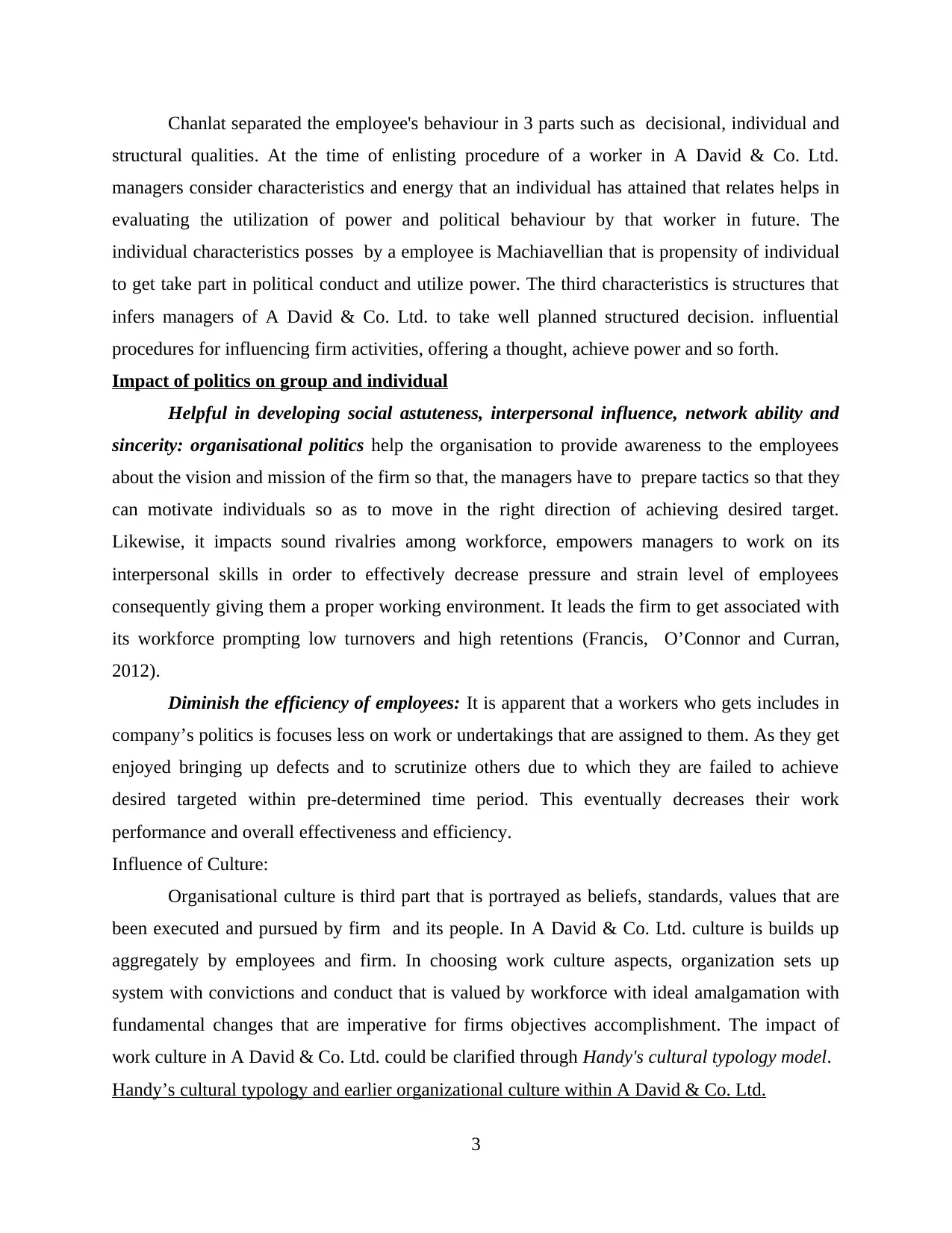
Chanlat separated the employee's behaviour in 3 parts such as decisional, individual and
structural qualities. At the time of enlisting procedure of a worker in A David & Co. Ltd.
managers consider characteristics and energy that an individual has attained that relates helps in
evaluating the utilization of power and political behaviour by that worker in future. The
individual characteristics posses by a employee is Machiavellian that is propensity of individual
to get take part in political conduct and utilize power. The third characteristics is structures that
infers managers of A David & Co. Ltd. to take well planned structured decision. influential
procedures for influencing firm activities, offering a thought, achieve power and so forth.
Impact of politics on group and individual
Helpful in developing social astuteness, interpersonal influence, network ability and
sincerity: organisational politics help the organisation to provide awareness to the employees
about the vision and mission of the firm so that, the managers have to prepare tactics so that they
can motivate individuals so as to move in the right direction of achieving desired target.
Likewise, it impacts sound rivalries among workforce, empowers managers to work on its
interpersonal skills in order to effectively decrease pressure and strain level of employees
consequently giving them a proper working environment. It leads the firm to get associated with
its workforce prompting low turnovers and high retentions (Francis, O’Connor and Curran,
2012).
Diminish the efficiency of employees: It is apparent that a workers who gets includes in
company’s politics is focuses less on work or undertakings that are assigned to them. As they get
enjoyed bringing up defects and to scrutinize others due to which they are failed to achieve
desired targeted within pre-determined time period. This eventually decreases their work
performance and overall effectiveness and efficiency.
Influence of Culture:
Organisational culture is third part that is portrayed as beliefs, standards, values that are
been executed and pursued by firm and its people. In A David & Co. Ltd. culture is builds up
aggregately by employees and firm. In choosing work culture aspects, organization sets up
system with convictions and conduct that is valued by workforce with ideal amalgamation with
fundamental changes that are imperative for firms objectives accomplishment. The impact of
work culture in A David & Co. Ltd. could be clarified through Handy's cultural typology model.
Handy’s cultural typology and earlier organizational culture within A David & Co. Ltd.
3
structural qualities. At the time of enlisting procedure of a worker in A David & Co. Ltd.
managers consider characteristics and energy that an individual has attained that relates helps in
evaluating the utilization of power and political behaviour by that worker in future. The
individual characteristics posses by a employee is Machiavellian that is propensity of individual
to get take part in political conduct and utilize power. The third characteristics is structures that
infers managers of A David & Co. Ltd. to take well planned structured decision. influential
procedures for influencing firm activities, offering a thought, achieve power and so forth.
Impact of politics on group and individual
Helpful in developing social astuteness, interpersonal influence, network ability and
sincerity: organisational politics help the organisation to provide awareness to the employees
about the vision and mission of the firm so that, the managers have to prepare tactics so that they
can motivate individuals so as to move in the right direction of achieving desired target.
Likewise, it impacts sound rivalries among workforce, empowers managers to work on its
interpersonal skills in order to effectively decrease pressure and strain level of employees
consequently giving them a proper working environment. It leads the firm to get associated with
its workforce prompting low turnovers and high retentions (Francis, O’Connor and Curran,
2012).
Diminish the efficiency of employees: It is apparent that a workers who gets includes in
company’s politics is focuses less on work or undertakings that are assigned to them. As they get
enjoyed bringing up defects and to scrutinize others due to which they are failed to achieve
desired targeted within pre-determined time period. This eventually decreases their work
performance and overall effectiveness and efficiency.
Influence of Culture:
Organisational culture is third part that is portrayed as beliefs, standards, values that are
been executed and pursued by firm and its people. In A David & Co. Ltd. culture is builds up
aggregately by employees and firm. In choosing work culture aspects, organization sets up
system with convictions and conduct that is valued by workforce with ideal amalgamation with
fundamental changes that are imperative for firms objectives accomplishment. The impact of
work culture in A David & Co. Ltd. could be clarified through Handy's cultural typology model.
Handy’s cultural typology and earlier organizational culture within A David & Co. Ltd.
3
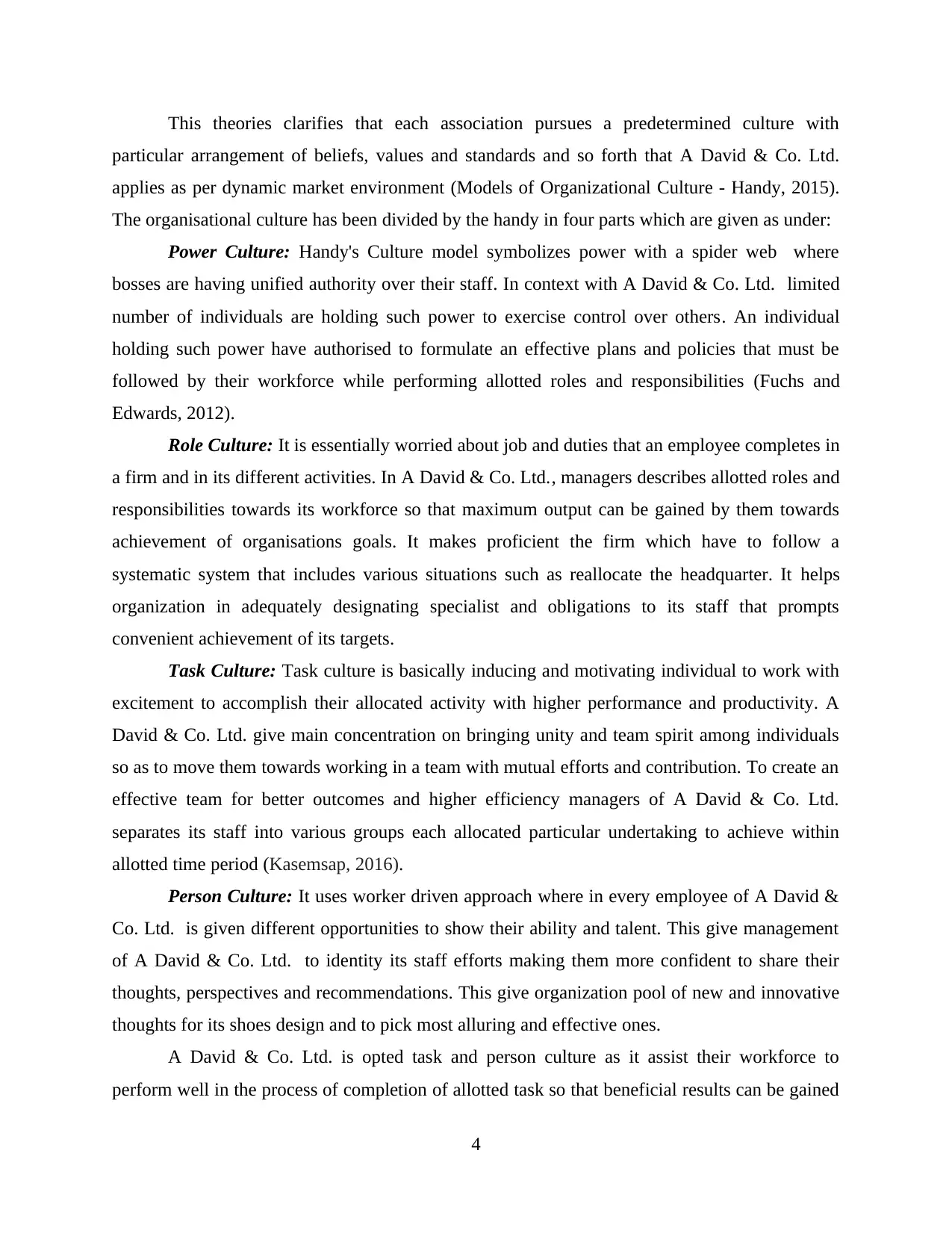
This theories clarifies that each association pursues a predetermined culture with
particular arrangement of beliefs, values and standards and so forth that A David & Co. Ltd.
applies as per dynamic market environment (Models of Organizational Culture - Handy, 2015).
The organisational culture has been divided by the handy in four parts which are given as under:
Power Culture: Handy's Culture model symbolizes power with a spider web where
bosses are having unified authority over their staff. In context with A David & Co. Ltd. limited
number of individuals are holding such power to exercise control over others. An individual
holding such power have authorised to formulate an effective plans and policies that must be
followed by their workforce while performing allotted roles and responsibilities (Fuchs and
Edwards, 2012).
Role Culture: It is essentially worried about job and duties that an employee completes in
a firm and in its different activities. In A David & Co. Ltd., managers describes allotted roles and
responsibilities towards its workforce so that maximum output can be gained by them towards
achievement of organisations goals. It makes proficient the firm which have to follow a
systematic system that includes various situations such as reallocate the headquarter. It helps
organization in adequately designating specialist and obligations to its staff that prompts
convenient achievement of its targets.
Task Culture: Task culture is basically inducing and motivating individual to work with
excitement to accomplish their allocated activity with higher performance and productivity. A
David & Co. Ltd. give main concentration on bringing unity and team spirit among individuals
so as to move them towards working in a team with mutual efforts and contribution. To create an
effective team for better outcomes and higher efficiency managers of A David & Co. Ltd.
separates its staff into various groups each allocated particular undertaking to achieve within
allotted time period (Kasemsap, 2016).
Person Culture: It uses worker driven approach where in every employee of A David &
Co. Ltd. is given different opportunities to show their ability and talent. This give management
of A David & Co. Ltd. to identity its staff efforts making them more confident to share their
thoughts, perspectives and recommendations. This give organization pool of new and innovative
thoughts for its shoes design and to pick most alluring and effective ones.
A David & Co. Ltd. is opted task and person culture as it assist their workforce to
perform well in the process of completion of allotted task so that beneficial results can be gained
4
particular arrangement of beliefs, values and standards and so forth that A David & Co. Ltd.
applies as per dynamic market environment (Models of Organizational Culture - Handy, 2015).
The organisational culture has been divided by the handy in four parts which are given as under:
Power Culture: Handy's Culture model symbolizes power with a spider web where
bosses are having unified authority over their staff. In context with A David & Co. Ltd. limited
number of individuals are holding such power to exercise control over others. An individual
holding such power have authorised to formulate an effective plans and policies that must be
followed by their workforce while performing allotted roles and responsibilities (Fuchs and
Edwards, 2012).
Role Culture: It is essentially worried about job and duties that an employee completes in
a firm and in its different activities. In A David & Co. Ltd., managers describes allotted roles and
responsibilities towards its workforce so that maximum output can be gained by them towards
achievement of organisations goals. It makes proficient the firm which have to follow a
systematic system that includes various situations such as reallocate the headquarter. It helps
organization in adequately designating specialist and obligations to its staff that prompts
convenient achievement of its targets.
Task Culture: Task culture is basically inducing and motivating individual to work with
excitement to accomplish their allocated activity with higher performance and productivity. A
David & Co. Ltd. give main concentration on bringing unity and team spirit among individuals
so as to move them towards working in a team with mutual efforts and contribution. To create an
effective team for better outcomes and higher efficiency managers of A David & Co. Ltd.
separates its staff into various groups each allocated particular undertaking to achieve within
allotted time period (Kasemsap, 2016).
Person Culture: It uses worker driven approach where in every employee of A David &
Co. Ltd. is given different opportunities to show their ability and talent. This give management
of A David & Co. Ltd. to identity its staff efforts making them more confident to share their
thoughts, perspectives and recommendations. This give organization pool of new and innovative
thoughts for its shoes design and to pick most alluring and effective ones.
A David & Co. Ltd. is opted task and person culture as it assist their workforce to
perform well in the process of completion of allotted task so that beneficial results can be gained
4
⊘ This is a preview!⊘
Do you want full access?
Subscribe today to unlock all pages.

Trusted by 1+ million students worldwide
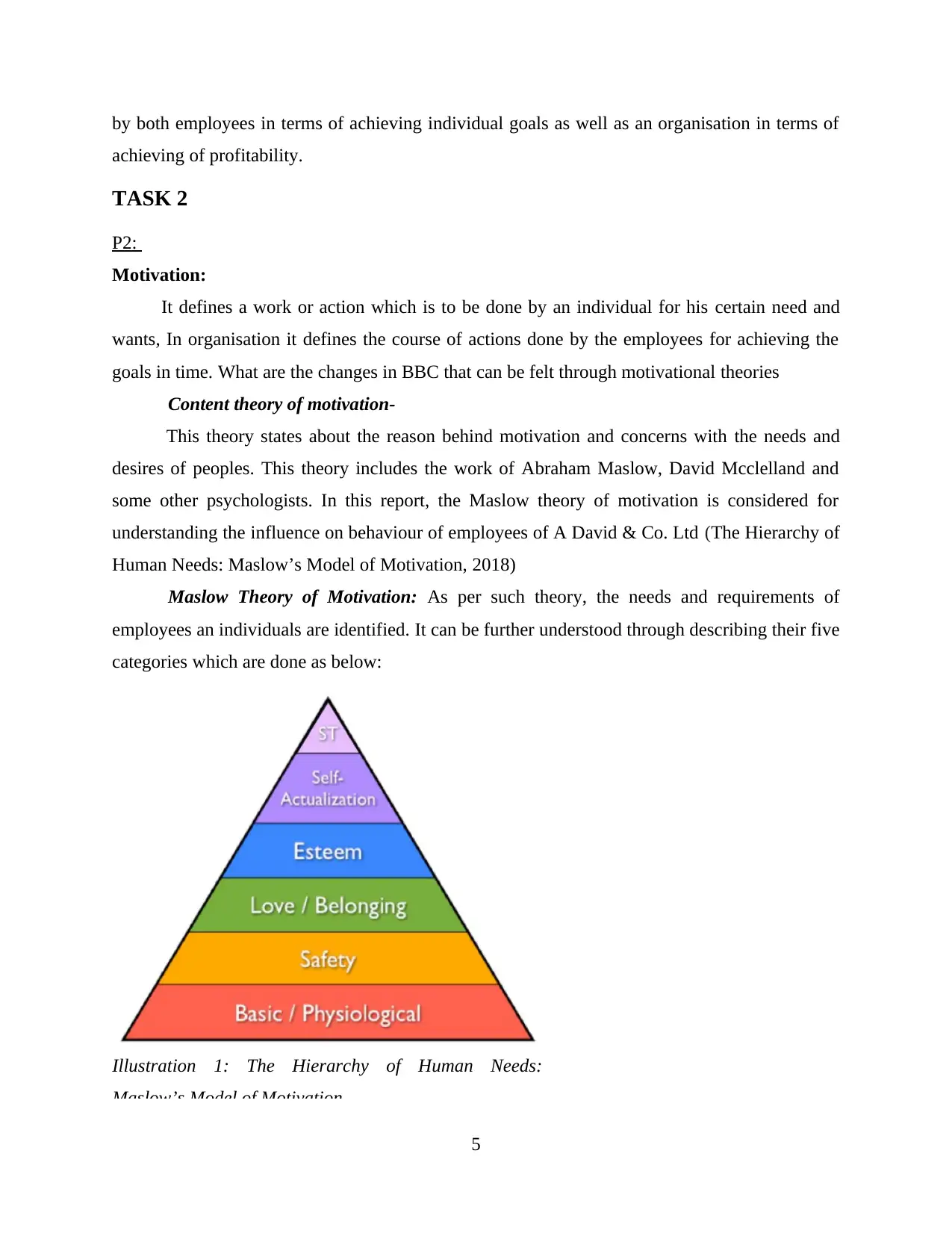
by both employees in terms of achieving individual goals as well as an organisation in terms of
achieving of profitability.
TASK 2
P2:
Motivation:
It defines a work or action which is to be done by an individual for his certain need and
wants, In organisation it defines the course of actions done by the employees for achieving the
goals in time. What are the changes in BBC that can be felt through motivational theories
Content theory of motivation-
This theory states about the reason behind motivation and concerns with the needs and
desires of peoples. This theory includes the work of Abraham Maslow, David Mcclelland and
some other psychologists. In this report, the Maslow theory of motivation is considered for
understanding the influence on behaviour of employees of A David & Co. Ltd (The Hierarchy of
Human Needs: Maslow’s Model of Motivation, 2018)
Maslow Theory of Motivation: As per such theory, the needs and requirements of
employees an individuals are identified. It can be further understood through describing their five
categories which are done as below:
Illustration 1: The Hierarchy of Human Needs:
Maslow’s Model of Motivation
5
achieving of profitability.
TASK 2
P2:
Motivation:
It defines a work or action which is to be done by an individual for his certain need and
wants, In organisation it defines the course of actions done by the employees for achieving the
goals in time. What are the changes in BBC that can be felt through motivational theories
Content theory of motivation-
This theory states about the reason behind motivation and concerns with the needs and
desires of peoples. This theory includes the work of Abraham Maslow, David Mcclelland and
some other psychologists. In this report, the Maslow theory of motivation is considered for
understanding the influence on behaviour of employees of A David & Co. Ltd (The Hierarchy of
Human Needs: Maslow’s Model of Motivation, 2018)
Maslow Theory of Motivation: As per such theory, the needs and requirements of
employees an individuals are identified. It can be further understood through describing their five
categories which are done as below:
Illustration 1: The Hierarchy of Human Needs:
Maslow’s Model of Motivation
5
Paraphrase This Document
Need a fresh take? Get an instant paraphrase of this document with our AI Paraphraser
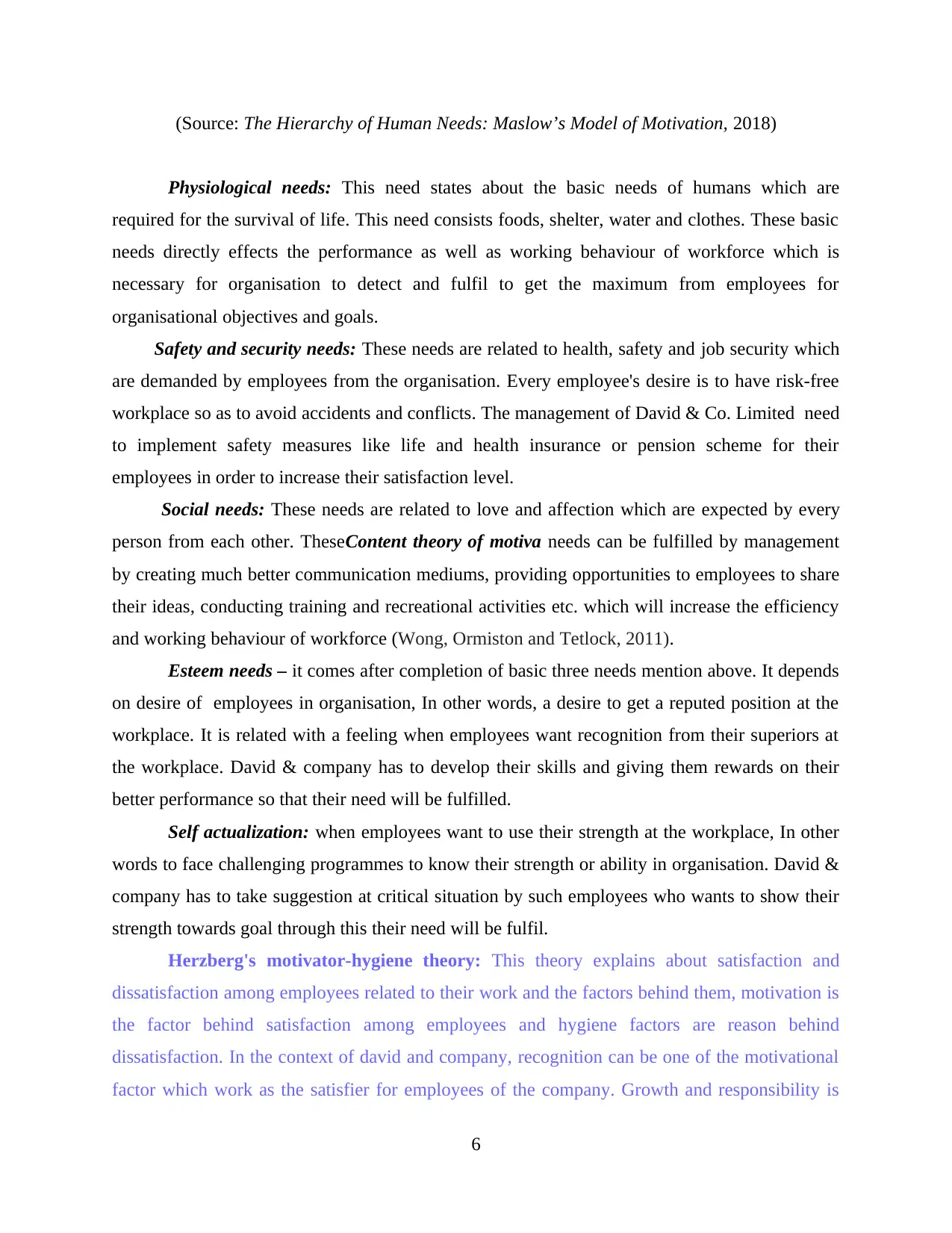
(Source: The Hierarchy of Human Needs: Maslow’s Model of Motivation, 2018)
Physiological needs: This need states about the basic needs of humans which are
required for the survival of life. This need consists foods, shelter, water and clothes. These basic
needs directly effects the performance as well as working behaviour of workforce which is
necessary for organisation to detect and fulfil to get the maximum from employees for
organisational objectives and goals.
Safety and security needs: These needs are related to health, safety and job security which
are demanded by employees from the organisation. Every employee's desire is to have risk-free
workplace so as to avoid accidents and conflicts. The management of David & Co. Limited need
to implement safety measures like life and health insurance or pension scheme for their
employees in order to increase their satisfaction level.
Social needs: These needs are related to love and affection which are expected by every
person from each other. TheseContent theory of motiva needs can be fulfilled by management
by creating much better communication mediums, providing opportunities to employees to share
their ideas, conducting training and recreational activities etc. which will increase the efficiency
and working behaviour of workforce (Wong, Ormiston and Tetlock, 2011).
Esteem needs – it comes after completion of basic three needs mention above. It depends
on desire of employees in organisation, In other words, a desire to get a reputed position at the
workplace. It is related with a feeling when employees want recognition from their superiors at
the workplace. David & company has to develop their skills and giving them rewards on their
better performance so that their need will be fulfilled.
Self actualization: when employees want to use their strength at the workplace, In other
words to face challenging programmes to know their strength or ability in organisation. David &
company has to take suggestion at critical situation by such employees who wants to show their
strength towards goal through this their need will be fulfil.
Herzberg's motivator-hygiene theory: This theory explains about satisfaction and
dissatisfaction among employees related to their work and the factors behind them, motivation is
the factor behind satisfaction among employees and hygiene factors are reason behind
dissatisfaction. In the context of david and company, recognition can be one of the motivational
factor which work as the satisfier for employees of the company. Growth and responsibility is
6
Physiological needs: This need states about the basic needs of humans which are
required for the survival of life. This need consists foods, shelter, water and clothes. These basic
needs directly effects the performance as well as working behaviour of workforce which is
necessary for organisation to detect and fulfil to get the maximum from employees for
organisational objectives and goals.
Safety and security needs: These needs are related to health, safety and job security which
are demanded by employees from the organisation. Every employee's desire is to have risk-free
workplace so as to avoid accidents and conflicts. The management of David & Co. Limited need
to implement safety measures like life and health insurance or pension scheme for their
employees in order to increase their satisfaction level.
Social needs: These needs are related to love and affection which are expected by every
person from each other. TheseContent theory of motiva needs can be fulfilled by management
by creating much better communication mediums, providing opportunities to employees to share
their ideas, conducting training and recreational activities etc. which will increase the efficiency
and working behaviour of workforce (Wong, Ormiston and Tetlock, 2011).
Esteem needs – it comes after completion of basic three needs mention above. It depends
on desire of employees in organisation, In other words, a desire to get a reputed position at the
workplace. It is related with a feeling when employees want recognition from their superiors at
the workplace. David & company has to develop their skills and giving them rewards on their
better performance so that their need will be fulfilled.
Self actualization: when employees want to use their strength at the workplace, In other
words to face challenging programmes to know their strength or ability in organisation. David &
company has to take suggestion at critical situation by such employees who wants to show their
strength towards goal through this their need will be fulfil.
Herzberg's motivator-hygiene theory: This theory explains about satisfaction and
dissatisfaction among employees related to their work and the factors behind them, motivation is
the factor behind satisfaction among employees and hygiene factors are reason behind
dissatisfaction. In the context of david and company, recognition can be one of the motivational
factor which work as the satisfier for employees of the company. Growth and responsibility is
6
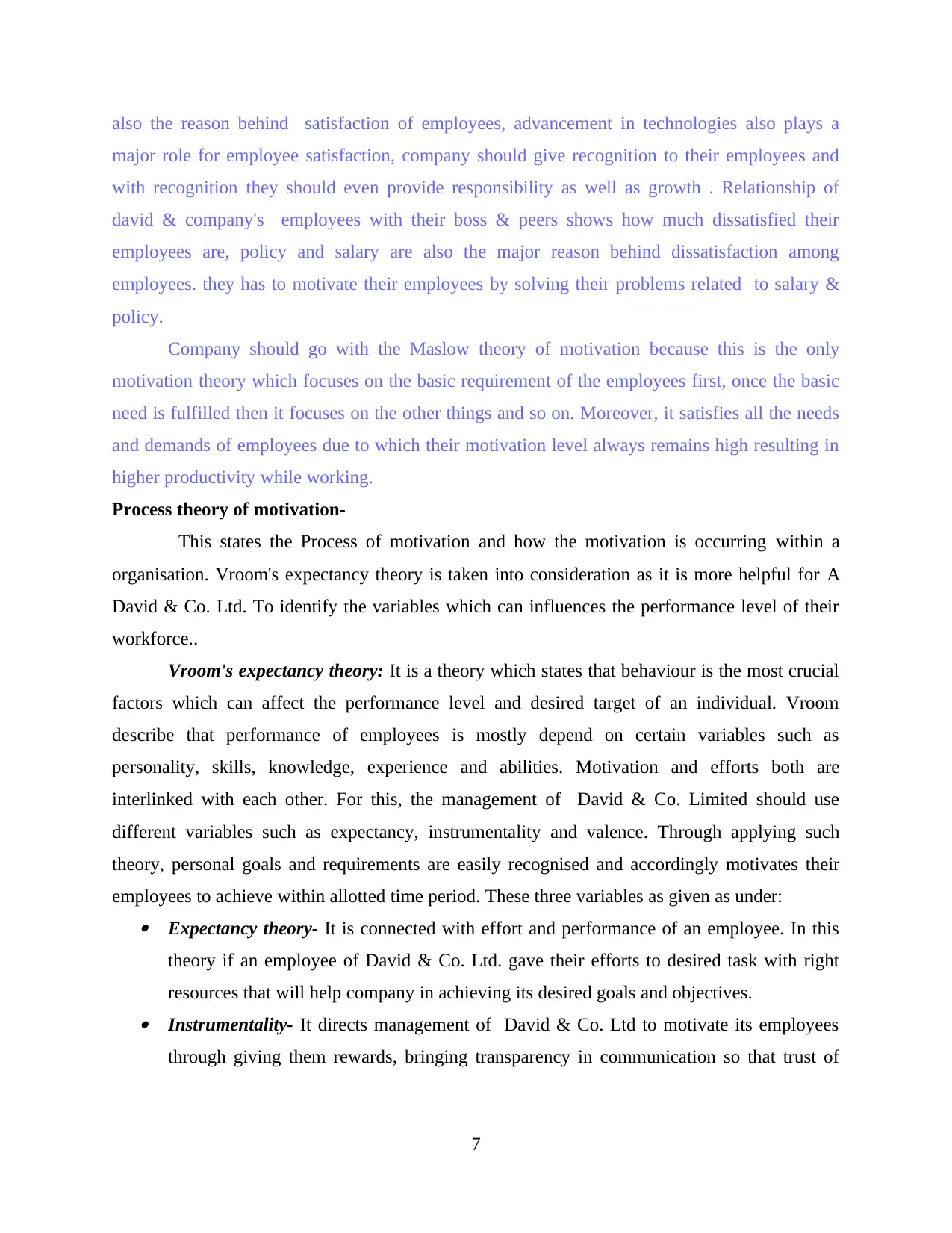
also the reason behind satisfaction of employees, advancement in technologies also plays a
major role for employee satisfaction, company should give recognition to their employees and
with recognition they should even provide responsibility as well as growth . Relationship of
david & company's employees with their boss & peers shows how much dissatisfied their
employees are, policy and salary are also the major reason behind dissatisfaction among
employees. they has to motivate their employees by solving their problems related to salary &
policy.
Company should go with the Maslow theory of motivation because this is the only
motivation theory which focuses on the basic requirement of the employees first, once the basic
need is fulfilled then it focuses on the other things and so on. Moreover, it satisfies all the needs
and demands of employees due to which their motivation level always remains high resulting in
higher productivity while working.
Process theory of motivation-
This states the Process of motivation and how the motivation is occurring within a
organisation. Vroom's expectancy theory is taken into consideration as it is more helpful for A
David & Co. Ltd. To identify the variables which can influences the performance level of their
workforce..
Vroom's expectancy theory: It is a theory which states that behaviour is the most crucial
factors which can affect the performance level and desired target of an individual. Vroom
describe that performance of employees is mostly depend on certain variables such as
personality, skills, knowledge, experience and abilities. Motivation and efforts both are
interlinked with each other. For this, the management of David & Co. Limited should use
different variables such as expectancy, instrumentality and valence. Through applying such
theory, personal goals and requirements are easily recognised and accordingly motivates their
employees to achieve within allotted time period. These three variables as given as under: Expectancy theory- It is connected with effort and performance of an employee. In this
theory if an employee of David & Co. Ltd. gave their efforts to desired task with right
resources that will help company in achieving its desired goals and objectives. Instrumentality- It directs management of David & Co. Ltd to motivate its employees
through giving them rewards, bringing transparency in communication so that trust of
7
major role for employee satisfaction, company should give recognition to their employees and
with recognition they should even provide responsibility as well as growth . Relationship of
david & company's employees with their boss & peers shows how much dissatisfied their
employees are, policy and salary are also the major reason behind dissatisfaction among
employees. they has to motivate their employees by solving their problems related to salary &
policy.
Company should go with the Maslow theory of motivation because this is the only
motivation theory which focuses on the basic requirement of the employees first, once the basic
need is fulfilled then it focuses on the other things and so on. Moreover, it satisfies all the needs
and demands of employees due to which their motivation level always remains high resulting in
higher productivity while working.
Process theory of motivation-
This states the Process of motivation and how the motivation is occurring within a
organisation. Vroom's expectancy theory is taken into consideration as it is more helpful for A
David & Co. Ltd. To identify the variables which can influences the performance level of their
workforce..
Vroom's expectancy theory: It is a theory which states that behaviour is the most crucial
factors which can affect the performance level and desired target of an individual. Vroom
describe that performance of employees is mostly depend on certain variables such as
personality, skills, knowledge, experience and abilities. Motivation and efforts both are
interlinked with each other. For this, the management of David & Co. Limited should use
different variables such as expectancy, instrumentality and valence. Through applying such
theory, personal goals and requirements are easily recognised and accordingly motivates their
employees to achieve within allotted time period. These three variables as given as under: Expectancy theory- It is connected with effort and performance of an employee. In this
theory if an employee of David & Co. Ltd. gave their efforts to desired task with right
resources that will help company in achieving its desired goals and objectives. Instrumentality- It directs management of David & Co. Ltd to motivate its employees
through giving them rewards, bringing transparency in communication so that trust of
7
⊘ This is a preview!⊘
Do you want full access?
Subscribe today to unlock all pages.

Trusted by 1+ million students worldwide
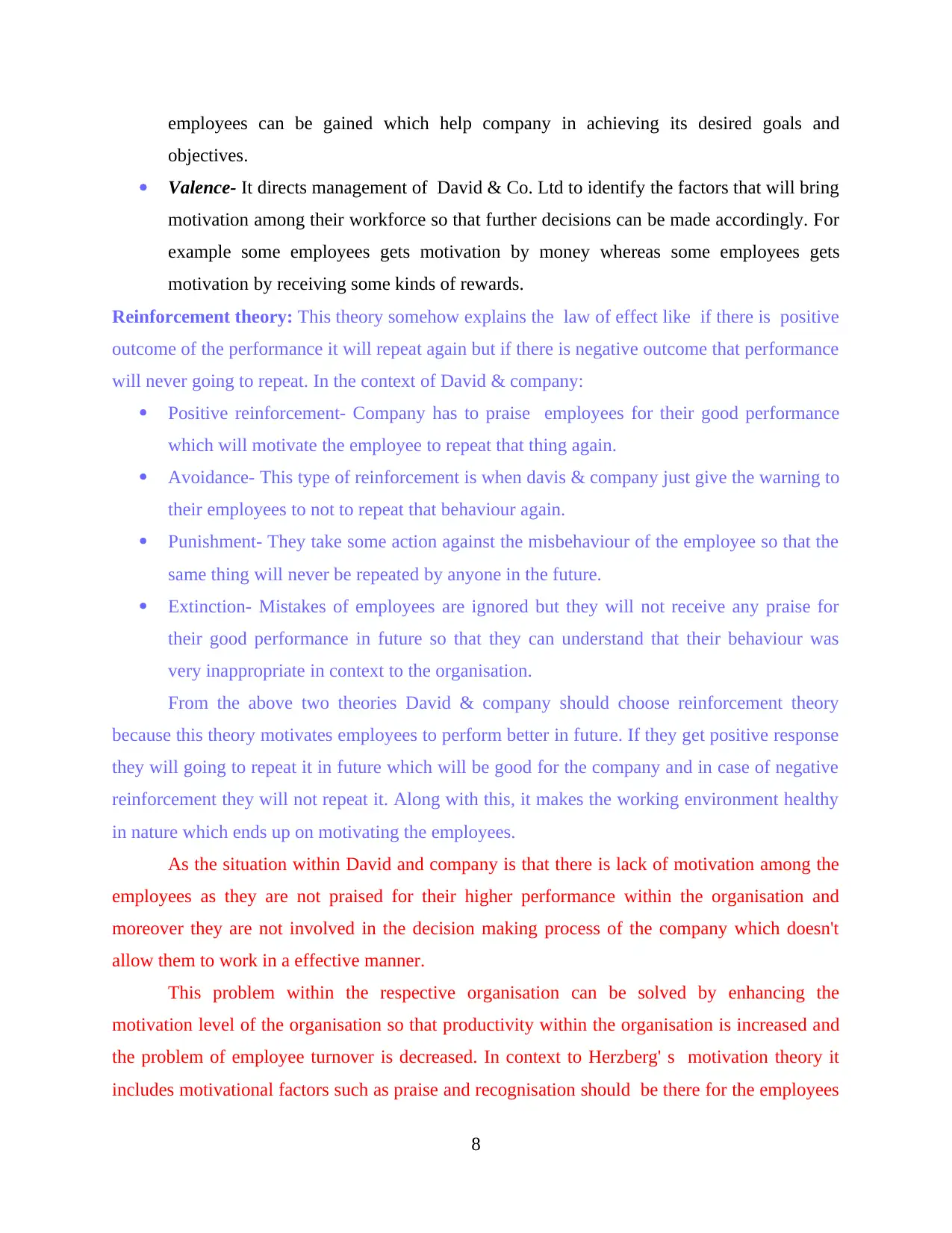
employees can be gained which help company in achieving its desired goals and
objectives.
Valence- It directs management of David & Co. Ltd to identify the factors that will bring
motivation among their workforce so that further decisions can be made accordingly. For
example some employees gets motivation by money whereas some employees gets
motivation by receiving some kinds of rewards.
Reinforcement theory: This theory somehow explains the law of effect like if there is positive
outcome of the performance it will repeat again but if there is negative outcome that performance
will never going to repeat. In the context of David & company:
Positive reinforcement- Company has to praise employees for their good performance
which will motivate the employee to repeat that thing again.
Avoidance- This type of reinforcement is when davis & company just give the warning to
their employees to not to repeat that behaviour again.
Punishment- They take some action against the misbehaviour of the employee so that the
same thing will never be repeated by anyone in the future.
Extinction- Mistakes of employees are ignored but they will not receive any praise for
their good performance in future so that they can understand that their behaviour was
very inappropriate in context to the organisation.
From the above two theories David & company should choose reinforcement theory
because this theory motivates employees to perform better in future. If they get positive response
they will going to repeat it in future which will be good for the company and in case of negative
reinforcement they will not repeat it. Along with this, it makes the working environment healthy
in nature which ends up on motivating the employees.
As the situation within David and company is that there is lack of motivation among the
employees as they are not praised for their higher performance within the organisation and
moreover they are not involved in the decision making process of the company which doesn't
allow them to work in a effective manner.
This problem within the respective organisation can be solved by enhancing the
motivation level of the organisation so that productivity within the organisation is increased and
the problem of employee turnover is decreased. In context to Herzberg' s motivation theory it
includes motivational factors such as praise and recognisation should be there for the employees
8
objectives.
Valence- It directs management of David & Co. Ltd to identify the factors that will bring
motivation among their workforce so that further decisions can be made accordingly. For
example some employees gets motivation by money whereas some employees gets
motivation by receiving some kinds of rewards.
Reinforcement theory: This theory somehow explains the law of effect like if there is positive
outcome of the performance it will repeat again but if there is negative outcome that performance
will never going to repeat. In the context of David & company:
Positive reinforcement- Company has to praise employees for their good performance
which will motivate the employee to repeat that thing again.
Avoidance- This type of reinforcement is when davis & company just give the warning to
their employees to not to repeat that behaviour again.
Punishment- They take some action against the misbehaviour of the employee so that the
same thing will never be repeated by anyone in the future.
Extinction- Mistakes of employees are ignored but they will not receive any praise for
their good performance in future so that they can understand that their behaviour was
very inappropriate in context to the organisation.
From the above two theories David & company should choose reinforcement theory
because this theory motivates employees to perform better in future. If they get positive response
they will going to repeat it in future which will be good for the company and in case of negative
reinforcement they will not repeat it. Along with this, it makes the working environment healthy
in nature which ends up on motivating the employees.
As the situation within David and company is that there is lack of motivation among the
employees as they are not praised for their higher performance within the organisation and
moreover they are not involved in the decision making process of the company which doesn't
allow them to work in a effective manner.
This problem within the respective organisation can be solved by enhancing the
motivation level of the organisation so that productivity within the organisation is increased and
the problem of employee turnover is decreased. In context to Herzberg' s motivation theory it
includes motivational factors such as praise and recognisation should be there for the employees
8
Paraphrase This Document
Need a fresh take? Get an instant paraphrase of this document with our AI Paraphraser
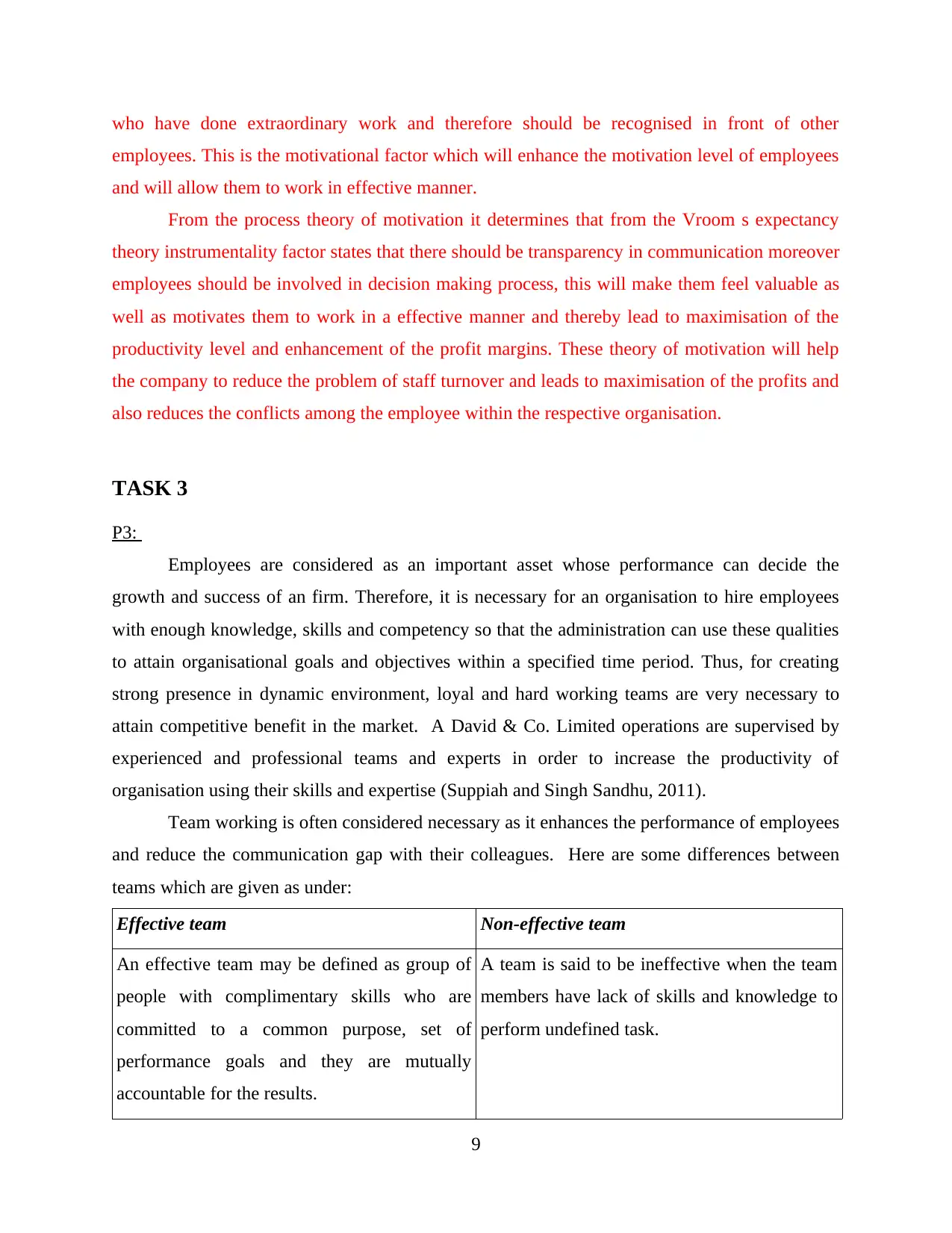
who have done extraordinary work and therefore should be recognised in front of other
employees. This is the motivational factor which will enhance the motivation level of employees
and will allow them to work in effective manner.
From the process theory of motivation it determines that from the Vroom s expectancy
theory instrumentality factor states that there should be transparency in communication moreover
employees should be involved in decision making process, this will make them feel valuable as
well as motivates them to work in a effective manner and thereby lead to maximisation of the
productivity level and enhancement of the profit margins. These theory of motivation will help
the company to reduce the problem of staff turnover and leads to maximisation of the profits and
also reduces the conflicts among the employee within the respective organisation.
TASK 3
P3:
Employees are considered as an important asset whose performance can decide the
growth and success of an firm. Therefore, it is necessary for an organisation to hire employees
with enough knowledge, skills and competency so that the administration can use these qualities
to attain organisational goals and objectives within a specified time period. Thus, for creating
strong presence in dynamic environment, loyal and hard working teams are very necessary to
attain competitive benefit in the market. A David & Co. Limited operations are supervised by
experienced and professional teams and experts in order to increase the productivity of
organisation using their skills and expertise (Suppiah and Singh Sandhu, 2011).
Team working is often considered necessary as it enhances the performance of employees
and reduce the communication gap with their colleagues. Here are some differences between
teams which are given as under:
Effective team Non-effective team
An effective team may be defined as group of
people with complimentary skills who are
committed to a common purpose, set of
performance goals and they are mutually
accountable for the results.
A team is said to be ineffective when the team
members have lack of skills and knowledge to
perform undefined task.
9
employees. This is the motivational factor which will enhance the motivation level of employees
and will allow them to work in effective manner.
From the process theory of motivation it determines that from the Vroom s expectancy
theory instrumentality factor states that there should be transparency in communication moreover
employees should be involved in decision making process, this will make them feel valuable as
well as motivates them to work in a effective manner and thereby lead to maximisation of the
productivity level and enhancement of the profit margins. These theory of motivation will help
the company to reduce the problem of staff turnover and leads to maximisation of the profits and
also reduces the conflicts among the employee within the respective organisation.
TASK 3
P3:
Employees are considered as an important asset whose performance can decide the
growth and success of an firm. Therefore, it is necessary for an organisation to hire employees
with enough knowledge, skills and competency so that the administration can use these qualities
to attain organisational goals and objectives within a specified time period. Thus, for creating
strong presence in dynamic environment, loyal and hard working teams are very necessary to
attain competitive benefit in the market. A David & Co. Limited operations are supervised by
experienced and professional teams and experts in order to increase the productivity of
organisation using their skills and expertise (Suppiah and Singh Sandhu, 2011).
Team working is often considered necessary as it enhances the performance of employees
and reduce the communication gap with their colleagues. Here are some differences between
teams which are given as under:
Effective team Non-effective team
An effective team may be defined as group of
people with complimentary skills who are
committed to a common purpose, set of
performance goals and they are mutually
accountable for the results.
A team is said to be ineffective when the team
members have lack of skills and knowledge to
perform undefined task.
9
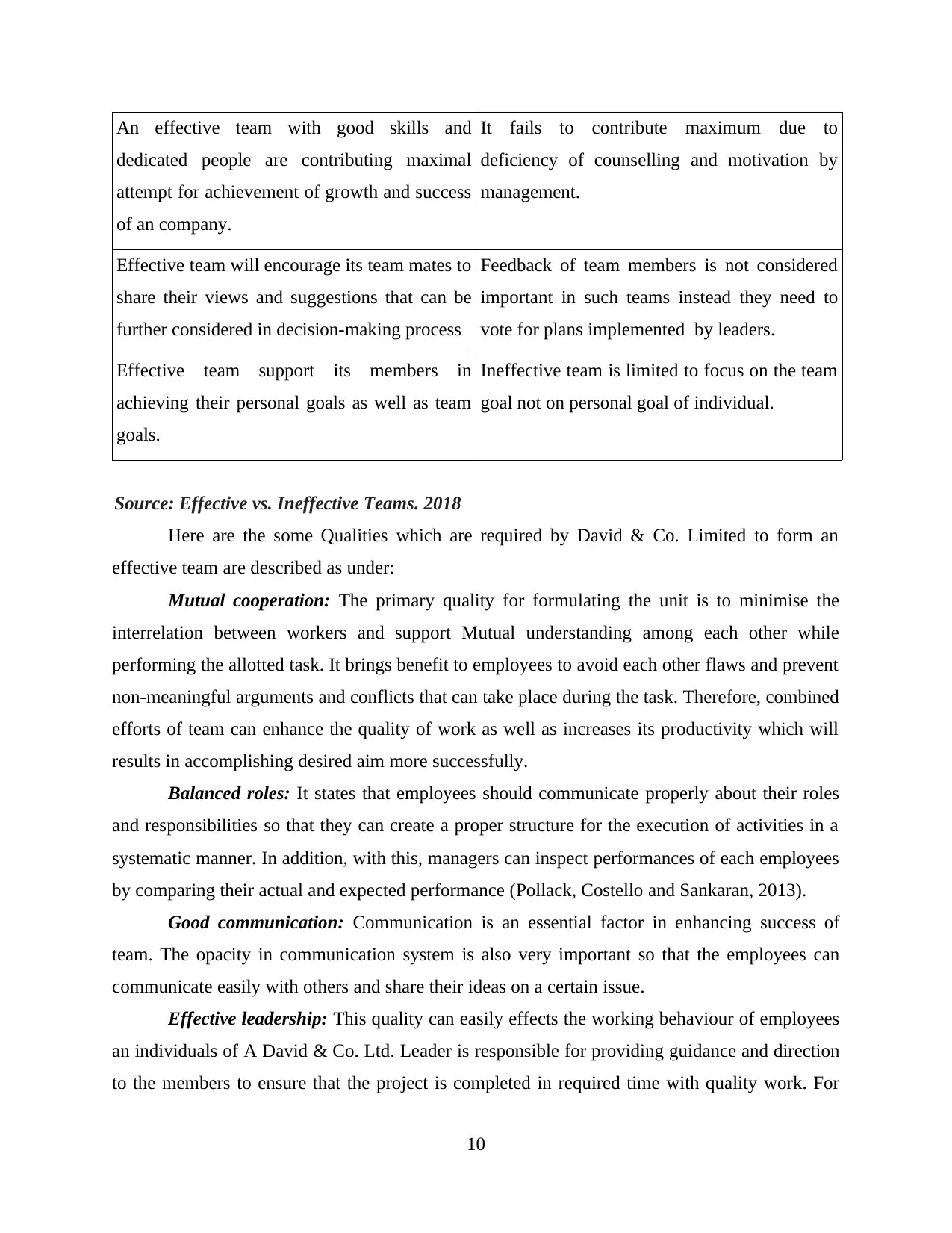
An effective team with good skills and
dedicated people are contributing maximal
attempt for achievement of growth and success
of an company.
It fails to contribute maximum due to
deficiency of counselling and motivation by
management.
Effective team will encourage its team mates to
share their views and suggestions that can be
further considered in decision-making process
Feedback of team members is not considered
important in such teams instead they need to
vote for plans implemented by leaders.
Effective team support its members in
achieving their personal goals as well as team
goals.
Ineffective team is limited to focus on the team
goal not on personal goal of individual.
Source: Effective vs. Ineffective Teams. 2018
Here are the some Qualities which are required by David & Co. Limited to form an
effective team are described as under:
Mutual cooperation: The primary quality for formulating the unit is to minimise the
interrelation between workers and support Mutual understanding among each other while
performing the allotted task. It brings benefit to employees to avoid each other flaws and prevent
non-meaningful arguments and conflicts that can take place during the task. Therefore, combined
efforts of team can enhance the quality of work as well as increases its productivity which will
results in accomplishing desired aim more successfully.
Balanced roles: It states that employees should communicate properly about their roles
and responsibilities so that they can create a proper structure for the execution of activities in a
systematic manner. In addition, with this, managers can inspect performances of each employees
by comparing their actual and expected performance (Pollack, Costello and Sankaran, 2013).
Good communication: Communication is an essential factor in enhancing success of
team. The opacity in communication system is also very important so that the employees can
communicate easily with others and share their ideas on a certain issue.
Effective leadership: This quality can easily effects the working behaviour of employees
an individuals of A David & Co. Ltd. Leader is responsible for providing guidance and direction
to the members to ensure that the project is completed in required time with quality work. For
10
dedicated people are contributing maximal
attempt for achievement of growth and success
of an company.
It fails to contribute maximum due to
deficiency of counselling and motivation by
management.
Effective team will encourage its team mates to
share their views and suggestions that can be
further considered in decision-making process
Feedback of team members is not considered
important in such teams instead they need to
vote for plans implemented by leaders.
Effective team support its members in
achieving their personal goals as well as team
goals.
Ineffective team is limited to focus on the team
goal not on personal goal of individual.
Source: Effective vs. Ineffective Teams. 2018
Here are the some Qualities which are required by David & Co. Limited to form an
effective team are described as under:
Mutual cooperation: The primary quality for formulating the unit is to minimise the
interrelation between workers and support Mutual understanding among each other while
performing the allotted task. It brings benefit to employees to avoid each other flaws and prevent
non-meaningful arguments and conflicts that can take place during the task. Therefore, combined
efforts of team can enhance the quality of work as well as increases its productivity which will
results in accomplishing desired aim more successfully.
Balanced roles: It states that employees should communicate properly about their roles
and responsibilities so that they can create a proper structure for the execution of activities in a
systematic manner. In addition, with this, managers can inspect performances of each employees
by comparing their actual and expected performance (Pollack, Costello and Sankaran, 2013).
Good communication: Communication is an essential factor in enhancing success of
team. The opacity in communication system is also very important so that the employees can
communicate easily with others and share their ideas on a certain issue.
Effective leadership: This quality can easily effects the working behaviour of employees
an individuals of A David & Co. Ltd. Leader is responsible for providing guidance and direction
to the members to ensure that the project is completed in required time with quality work. For
10
⊘ This is a preview!⊘
Do you want full access?
Subscribe today to unlock all pages.

Trusted by 1+ million students worldwide
1 out of 19
Related Documents
Your All-in-One AI-Powered Toolkit for Academic Success.
+13062052269
info@desklib.com
Available 24*7 on WhatsApp / Email
![[object Object]](/_next/static/media/star-bottom.7253800d.svg)
Unlock your academic potential
Copyright © 2020–2026 A2Z Services. All Rights Reserved. Developed and managed by ZUCOL.




